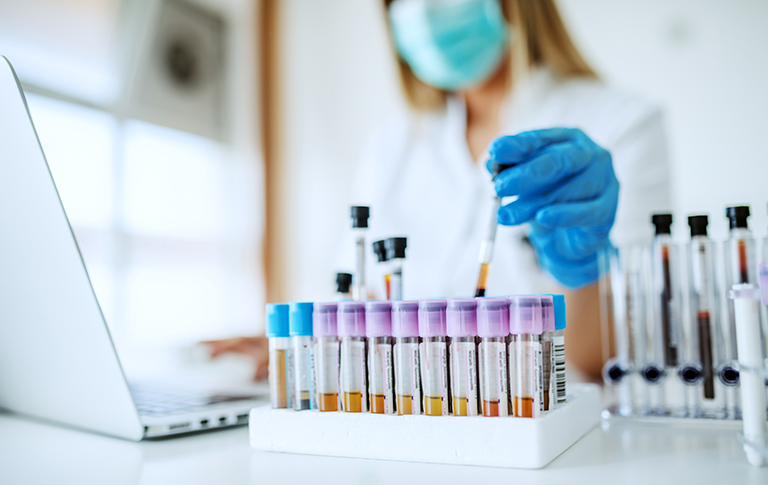Every therapy, drug or approach that is in place today to treat cancer had its start in a clinical trial. American Oncology Partner practices bring innovative treatment options to patients, close to home. By partnering with Sarah Cannon, a global leader in offering community-based clinical trials, we offer clinical trial options to patients across several locations within AON’s network of oncology practices.
Cutting-Edge
Clinical Trials

Why participate in clinical trials?
Clinical trials are designed to evaluate the effectiveness of new treatment interventions. The objective of these clinical trials is to test new therapies in patients who have cancer. Patients participate in clinical trials for several reasons, including:
- The potential to benefit from a new drug or treatment procedure
- Improved management of symptoms resulting from treatment of cancer
- The opportunity to directly contribute to improving the understanding of how to treat a cancer and ultimately, benefit other patients
Patients who participate in clinical trials receive either a promising new treatment or the best available conventional treatment. If a new treatment option is proven to work, patients who are participating in the clinical trial will be among the first to benefit. While there is no guarantee that any treatment will be successful, clinical trials have been proven to offer some of the most effective cancer treatments currently available today.
Talk to your doctor to discuss your clinical trial options.
Search for a Clinical Trial
Cancer Type
Practice
Line of Therapy
Lung Cancer
Beamion LUNG-2: A Phase III, open-label, randomized, activecontrolled, multi-centre trial evaluating orally administered BI 1810631 compared with standard of care as first-line treatment in patients with unresectable, locally advanced or metastatic nonsquamous non-small cell lung cancer harbouring HER2 tyrosine kinase domain mutations
MORE DETAILSProstate Cancer
A Phase 1 Study Evaluating the Safety, Tolerability, Pharmacokinetics, and Efficacy of AMG 509 in Subjects With Metastatic Castration-Resistant Prostate Cancer
MORE DETAILSLung Cancer
A Phase 3, Open-label, Multicenter, Randomized Study of Tarlatamab in Combination With Durvalumab vs Durvalumab Alone in Subjects With Extensive-Stage Small-Cell Lung Cancer Following Platinum, Etoposide and Durvalumab (DeLLphi-305)
MORE DETAILSBiliary Cancer, Bladder Cancer, Brain Cancer, Breast Cancer, Colon and Rectal Cancer, Kidney Cancer, Liver Cancer, Lung Cancer, Melanoma, Ovarian and Endometrial Cancer, Pancreatic Cancer, Prostate Cancer
A Phase 1/1b/2 Study Evaluating the Safety, Tolerability, Pharmacokinetics, Pharmacodynamics, and Efficacy of AMG 193 Alone and in Combination With Docetaxel in Subjects With Advanced MTAP-null Solid Tumors
MORE DETAILSMelanoma
A Randomized, Double-blind Study Evaluating the Efficacy, Safety, and Immunogenicity of ABP 206 Compared with Opdivo (Nivolumab) in Subjects with Treatment-naïve Unrespectable or Metastatic Melanoma
MORE DETAILSLung Cancer
An Open Label, First-in-human Study of BAY 2927088 in Participants With Advanced Non-small Cell Lung Cancer (NSCLC) Harboring an EGFR and/or HER2 Mutation
MORE DETAILSHead and Neck Cancer
Randomized, Double-blind, Placebo-controlled Phase 3 Study to Evaluate Dostarlimab as Sequential Therapy After Chemoradiation in Participants With Locally Advanced Unresected Head and Neck Squamous Cell Carcinoma
MORE DETAILSMultiple Myeloma
A Post-authorization Safety Study to Evaluate the Incidence of and Risk Factors for Severe and Fatal Infusion-related Reactions in Participants Treated with Daratumumab (Intravenous or Subcutaneous)
MORE DETAILSLung Cancer
A Phase 2, open-label, randomized trial evaluating the impact of enhanced versus standard dermatologic management on selected dermatologic adverse events among patients with locally advanced or metastatic EGFR-mutated NSCLC treated first-line with amivantamab + lazertinib
MORE DETAILS



